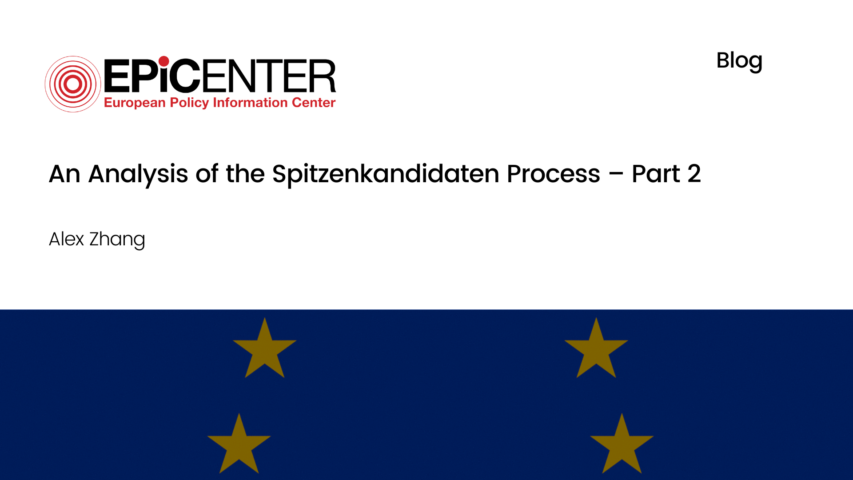An Analysis of the Spitzenkandidaten Process – Part 2

An Analysis of the Spitzenkandidaten Process – Part 2
Alex Zhang // 12 December 2019
Classic political theories suggest that a democratic government should have both “input” and “output” legitimacy. A political institution relies public opinion and policy preference, the “input”, or democratic process, from the people, and the good legislation outcomes, or the “output” to be the source of its legitimacy.
After the Euro crisis, the immigration crisis, and Brexit, the legitimacy of the European Union is being unprecedently challenged. Therefore, when the “output” policy effect is in question, the EU is attempting to increase its input legitimacy. One of the proposals to achieve more democracy is the Spitzenkandidaten process first tried and tested with the appointment of the Juncker Commission in 2014. In this process, each political group in the European Parliament can nominate their own candidate for the Commission Presidency, and the largest party after the election, shall claim the role.
The main objectives of the plan are democratising the traditionally technocratic Commission and encouraging more voting participation for EU citizens. However, we found that the process is not a silver bullet for these issues. In fact it is poorly designed to achieve those two objectives.
Democratisation of the Commission?
Supporters of the Spitzenkandidaten process argue that because the Commission has some important and unique legislative power, it must be constrained and democratised. Specifically, because the Commission has the monopoly on legislative initiatives and agenda-setting, the Parliament, the elected government of Europe, must have certain controls over the Commission. In other words, a good record for the Commission is not legitimate or sufficient. It requires a democratic mechanism to ensure the policy output continues to satisfy.
This simply overestimates the capacity of the European Commission. As legal scholar Marco Goldoni says, the Commission is “mostly dictated by the project of the internal market and its realization.” However, “on the other new policy-related fields taken up by the EU in recent years, the Commission does not really have any power or faculty of initiative.” This again means, again, the Commission does not have a strong say in topics other than those that it is originally intended for. Therefore, it is legitimate to keep the Commission out of politics and democratisation to ensure its efficiency.
Besides, we should not forget the fact that the European Parliament has gained significant power over the candidate for the Commission President. Most importantly, the Parliament has the power of rejecting the proposed candidate from the European Council. The most recent empowerment of the Parliament comes from the Lisbon Treaty (2007), whereby the European Election is explicitly linked to the Commission Presidency: The Treaty requires the European Council to “[take] into account the elections to the European Parliament” when considering candidates for the Commission President. On top of that, the new treaty mandates the European Council to “propose”, (instead of formerly “nominate”), a candidate to the European Parliament, who later “elect” (rather than “approve”) the person. These clauses collectively give the Parliament, the elected officials, a strong say on the President candidacy even without the Spitzenkandidaten process.
Encouraging Voting in the EU?
Since 1979, the turnout rate of voting has been consistently declining, which many EU scholars attribute to the decreasing relevance of pan-European politics. European citizens simply find the EU topic less relevant, therefore they are less motivated to vote on it. As a result, the European elections were treated as secondary to national elections. Many supporters of the Spitzenkandidaten process believe that it will create more discussions about European Union politics, and thus generate more pan-European parties and interests, which will eventually encourage more voters to participate in EU politics, and show their policy preferences.
First, the effect of the process on voting rates is unknown, as it kept decreasing after the Junker 2014 election. But more importantly, the problem with this argument is that it may potentially have reverse causality bias. Is politicisation a necessary condition for increasing the relevance of the EU, or it will be a natural demand of the European citizens when the topics are relevant enough? After all, the Union is not a nation-state. If currently, European citizens are more focused on politics on the national level, democratically they may be entitled to be so. It may be better to achieve EU political relevance economically, by continuing the realisation of the internal market. In other words, the realisation of the initiative requires an environment of bottom-up political mobilisation.
Conclusion
After discussing the two objectives that the Spitzenkandidaten intends to achieve we found that the plan is problematic to these topics, or that these issues are not supposed to be solved by the EU in the first place. Instead, a proactive solution should be increasing transparency of the Commission itself and improve the output policy.
EPICENTER publications and contributions from our member think tanks are designed to promote the discussion of economic issues and the role of markets in solving economic and social problems. As with all EPICENTER publications, the views expressed here are those of the author and not EPICENTER or its member think tanks (which have no corporate view).



